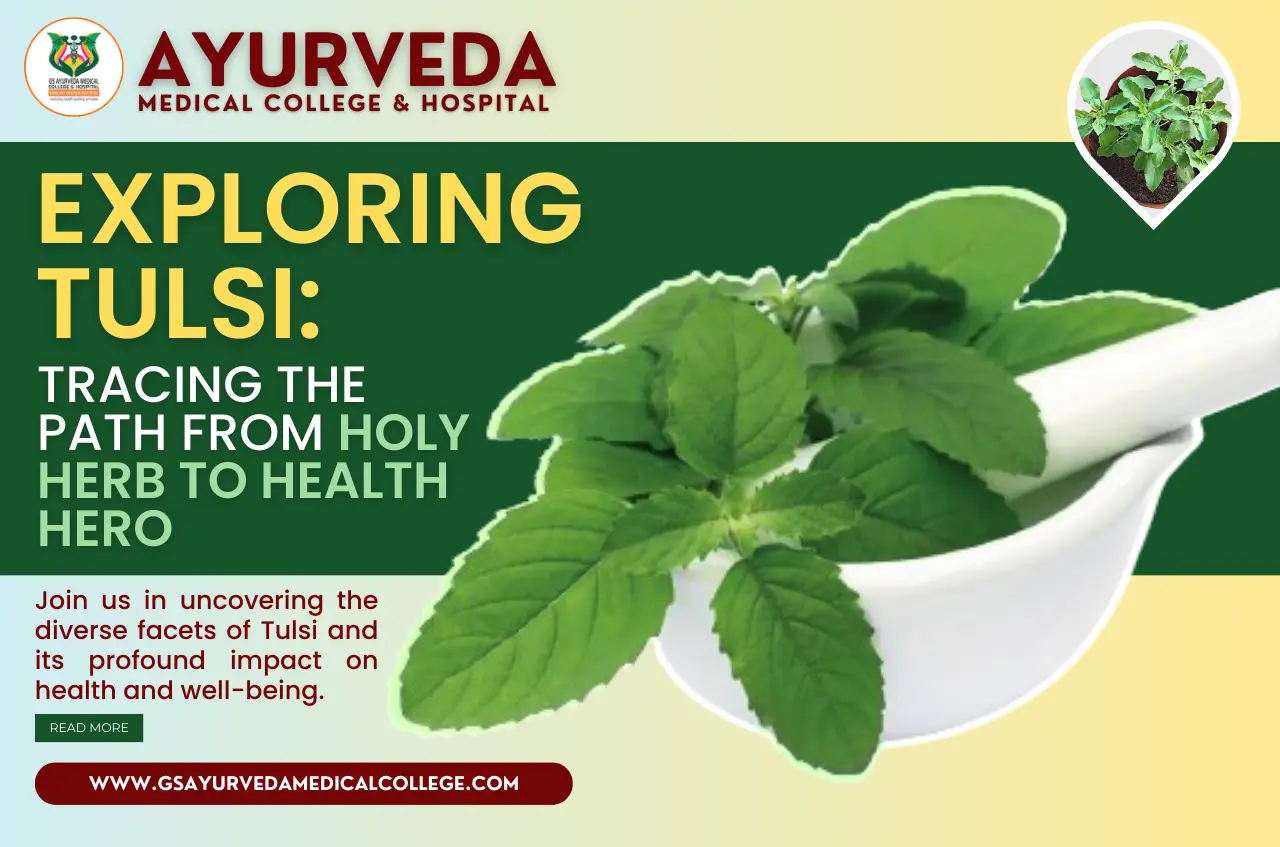
Exploring Tulsi: Tracing the Path from Holy Herb to Health Hero
Welcome to GS Ayurveda Medical College and Hospital, where the ancient wisdom of Ayurveda converges with modern education. In this blog, we embark on a journey to explore the remarkable herb, Tulsi, and its evolution from a holy symbol to a health hero. As one of the Top 10 Private BAMS Colleges in UP and a beacon of Ayurvedic education in Delhi-NCR, GS Ayurveda Medical College and Hospital is dedicated to unravelling the therapeutic potential of nature's gifts. Join us in uncovering the diverse facets of Tulsi and its profound impact on health and well-being.
1. Tulsi - A Sacred Symbol in Ayurveda
The Reverence for Tulsi in Ayurveda:
Tulsi, also known as Holy Basil, holds a revered place in Ayurveda, the ancient system of natural healing. With its aromatic leaves and sacred significance, Tulsi is not merely a plant; it is a symbol of purity, auspiciousness, and holistic wellness in Ayurvedic traditions.
Ayurvedic Wisdom Passed Down Through Ages:
Ayurveda, rooted in the profound connection between mind, body, and spirit, considers Tulsi a symbol of divinity and an embodiment of healing energy. The medicinal properties of Tulsi have been cherished and documented in Ayurvedic texts, passed down through generations.
2. The Botanical Brilliance of Tulsi
Taxonomy and Varieties:
Tulsi, scientifically known as Ocimum sanctum, belongs to the Lamiaceae family. While there are several varieties of Tulsi, the three primary types—Rama Tulsi, Krishna Tulsi, and Vana Tulsi—stand out for their distinct characteristics and therapeutic properties.
Nutritional Profile:
Tulsi is a powerhouse of nutrients, including vitamins A and C, calcium, iron, and essential oils. Its antioxidant-rich nature makes it a valuable addition to Ayurvedic formulations, promoting overall health and vitality.
3. Tulsi in Ayurvedic Healing
Adaptogenic Properties:
Tulsi is celebrated for its adaptogenic properties, helping the body adapt to stress and maintain balance. In Ayurveda, it is considered an invaluable herb for promoting resilience and enhancing the body's ability to cope with various stressors.
Immune System Support:
The immunomodulatory effects of Tulsi make it a potent ally in bolstering the immune system. Its ability to enhance the body's natural defence mechanisms has earned Tulsi a significant place in Ayurvedic formulations for immune support.
4. Tulsi's Role in Respiratory Health
Respiratory Wellness:
Tulsi has been traditionally used in Ayurveda to support respiratory health. Its expectorant properties help alleviate respiratory issues, making it a key component in formulations aimed at promoting clear breathing.
Asthma Management:
Ayurvedic texts extol Tulsi's efficacy in managing asthma symptoms. Its anti-inflammatory and bronchodilator effects contribute to its role in mitigating respiratory distress associated with asthma.
5. Tulsi as an Antimicrobial Agent
Antibacterial and Antiviral Properties:
Tulsi possesses potent antibacterial and antiviral properties, making it a natural antimicrobial agent. In Ayurveda, Tulsi is recommended to combat infections and support the body's defence against harmful pathogens.
Oral Health Benefits:
The antimicrobial qualities of Tulsi extend to oral health. Its inclusion in Ayurvedic toothpaste and mouthwashes is attributed to its ability to inhibit the growth of oral bacteria, promoting gum health and preventing cavities.
6. Tulsi's Impact on Mental Well-being
Stress Relief:
Tulsi's adaptogenic properties extend to mental well-being, offering stress relief and aiding in the management of anxiety. Ayurveda recognizes the interconnectedness of the mind and body, and Tulsi plays a role in fostering a sense of calm and balance.
Cognitive Function:
Ayurvedic practitioners acknowledge Tulsi's potential to enhance cognitive function. Its neuroprotective properties are believed to contribute to mental clarity and focus, aligning with Ayurveda's holistic approach to overall well-being.
7. Tulsi in Ayurvedic Education at GS Ayurveda Medical College
Integrating Tradition with Modern Science:
At GS Ayurveda Medical College and Hospital, we take pride in integrating traditional Ayurvedic wisdom with modern scientific knowledge. Our curriculum reflects the rich heritage of Ayurveda, including the therapeutic potential of herbs like Tulsi.
Practical Application and Research:
Students at GS Ayurveda Medical College engage in hands-on learning, including the cultivation and study of medicinal plants. Our commitment to research ensures that Ayurvedic practices, such as those involving Tulsi, are explored and validated in contemporary contexts.
8. Tulsi Conservation and Sustainability
Cultivating Awareness:
As stewards of Ayurvedic knowledge, GS Ayurveda Medical College emphasizes the importance of environmental conservation. Tulsi, being a vital component in Ayurveda, is cultivated with care, and students are educated on sustainable practices.
Empowering Communities:
GS Ayurveda Medical College is committed to empowering local communities through initiatives that promote the cultivation and sustainable harvesting of medicinal plants, including Tulsi. This aligns with our vision of creating a holistic impact on both health and the environment.
Conclusion
Tulsi stands as a testament to the timeless wisdom embedded in Ayurveda. From its revered status in ancient traditions to its recognized health benefits in modern science, Tulsi exemplifies the synergy between tradition and innovation. At GS Ayurveda Medical College and Hospital which is among the BAMS Colleges in Uttar Pradesh, and the Best Private BAMS Colleges in Delhi-NCR, we are dedicated to unravelling the potential of nature's gifts for the holistic well-being of our students and the communities we serve. Join us in the exploration of Tulsi, from a holy herb to a health hero, as we continue to chart new frontiers in Ayurvedic education and practice.

